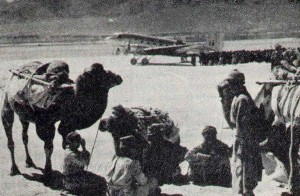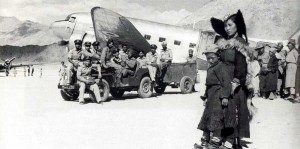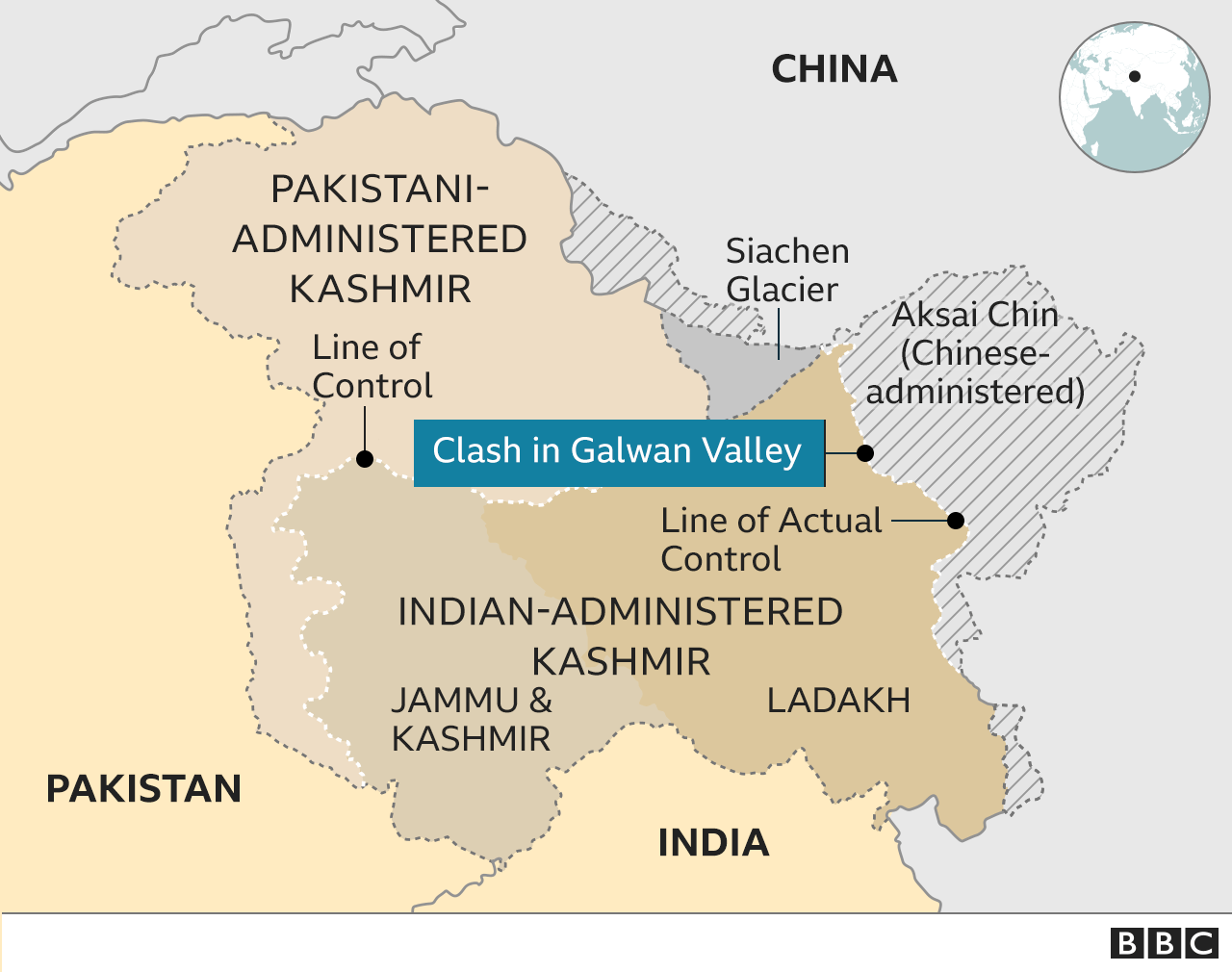It whirled and it spun and then…. And then time stood still. Have you, in a manner of speaking, ever gone through a whirlwind, a tornado? A tornado of feelings that drives you into a vortex of uncontrollable spins? I have only seen a tsunami hit the shores of Thailand in pictures and held my breath in disbelief and terror. Time must have stood still for all those who were swept away by the unforgiving force of nature.
Time, similarly, stood still for me on November 24, 1962. My father, Lt Col Brahmanand Avasthy, commanding officer of 4 Rajput, was leading a part of his battalion back to base after the ceasefire in the Sino-Indian war was announced. The Chinese, devious as always, laid an ambush and massacred the column of approximately 200 men. The Indians fought bravely, to the last man and the last round. Hand-to-hand fighting followed and, grossly outnumbered, they lay down their lives. Their bravery in battle has gone down in the annals of military history. The Chinese dug a common grave and threw the bodies there. They gave my father the dignity of rolling him in a blanket and put a mess tin with an inscription: “Commanding Officer. He fought like a TIGER”. From his pocket was found a blood-soaked letter to my mother. Most of his letters written to us arrived home months after he died, with his sparse material objects…uniforms, the last civvies he wore and his medals. He had kept letters written by us in his pocket. Maybe his last thoughts were of his wife and his two little girls. Who knows? But I do know that as a soldier he must have wanted to achieve victory for his nation till his last desperate breath.
ALSO READ: Why India Feels Cornered Than Never Before By A Hostile Neighbourhood
The local Lamas of a nearby monastery were witness to the battle. Another witness, a young villager then, still lives there. He tells us stories of the valiant fight my father and his unit put up against the Chinese, who lay in ambush. Till today, there is an annual fair held at the site. People come and pray to the “TIGER” of La Gyala Gompa, Morshing village, Arunachal Pradesh, as he began to be called.
After the hysteria dies down, the fallen are forgotten, their families consigned to lives of loneliness and struggle.
Later, the army built a memorial at the spot and I could visit it, in the far reaches of Arunachal Pradesh, along with my husband, Lt Gen Milan Naidu, PVSM, AVSM, YSM, then vice-chief of the Indian Army. No doubt, the memory of my father makes us proud daughters. But children like us want an answer to the question: Why?
I must make it clear that amidst this cacophony of varying views, some provocative, some middle-line, some openly aggressive, I speak just as a wife, mother or a godmother. I do not speak for the thousands of those in uniform who I feel are also my family-members. They are promised to this country, for war or peace. But I and thousands of mothers, daughters and sisters like me will agree that all we want is the safety of our men. If a drop of their blood spills, it kills something inside us. There are perhaps no answers to the question: What will we gain by war. If war is inevitable, the forces should be made capable of victory, like in 1971. The soldiers are ready for everything in war or peace, but their hands should be fortified by powers that be. Their sacrifice should not go in vain.
ALSO READ: Sweet, Bitter and Tepid: A Look At India’s Relationship With Neighbours
Maybe I will get a lot of flak from armchair patriots. But has anyone given a thought to the families of the Pulwama casualties after a month of their deaths? After the initial hysteria dies down, all those men are forgotten. The women and children are forgotten and consigned to the lives of loneliness and struggle. This is a bitter truth. Every other day, our boys die in various sectors. Does anyone even try to reach out to their families? A bit of cluck-clucking on social media, and their job is done. My mother was looked after by the army and our friends; not the government. It pains me to say this, but it is the truth. Every country fights for their country’s sovereignty. I proudly subscribe to that, but I don’t condone sacrifices in vain.

Lt Col Brahmanand Avasthy, commanding officer of 4 Rajput, with his wife
I do hear and read on social media and from some heartless politicians that soldiers are paid to die. I throw the gauntlet to all here. Take what you want, but go and stay a few months on Bana Post on Siachen Glacier and protect India. The soldiers who do their duty uncomplainingly need a united heart of this country that beats for them.
ALSO READ: Pangong Tso Lake: Why It’s A Sore Finger In Relationship Between India And China
Post 1962, people playing tambola would say, “6 and 2—62, Chinese aggression”. For me, it was not only an invasion, it was the annihilation of my life, the life of my mother and that of my little kid sister, who was all of 5. A few days ago, I saw the picture of Col Santosh Babu’s young son salute his father’s lifeless body, draped in the tricolor, and memories flooded my mind’s eye. China remains the perpetrator and young children are still thrown into trauma. Their fathers will always stay in their veins, alive in the tales of valour. But what is going to happen to those lonely days, those nights filled with fear? This feeling of cold dread grips my heart when I see video grabs of the Galwan battle casualties–young Satnam Singh, newly-married Sepoy Ankur, Havildar Palani’s bodies arriving home to weeping, wailing mothers, wives and sisters. I see myself standing, a little lost child, not really understanding what is going on. “Where is my dad? This can’t be my dad who I sent to war, waving and smiling, telling me that next month he shall be back and buy me my new frock and the doll I wanted so much!” My little child’s eyes watch as army officers, state government representatives all descend on the villages and homes of these warriors. ‘Wow, isn’t that army truck looking lovely with flowers?’ Such is how children caught in the moment think. They do not have any idea of what lies ahead. They know nothing about white clothes their mothers will be made to wear; maybe cut her hair, as mine had done; or the smiles and joy that had forever been burnt in those flames that I see now, mercilessly licking away at their dad’s remains.
I never saw my dad again. We never saw his body. I never saw any of these uniformed people or the sympathising hordes at our doorstep. Yes, it is a now a long-forgotten debacle. Nothing was what it is like today. We live in a replaced generation to whom only Kargil smells of war.
ALSO READ: Chinese Tension Haunts Ladakh Even As Valley Remains On The Boil
On a mess tin they kept with my father’s body, the Chinese wrote: ‘Commanding Officer. He fought like a TIGER’.
While I am deeply grateful that mothers, wives, sisters and children now are well cared for and looked after, I often find myself wonder what wrong we did. Did my mother make a mistake in marrying a soldier who was being led by the nose by faulty political promises and the policies of Nehru, Krishna Menon and B.M. Kaul? My father went to battle in cotton shirts and tarpaulin boots. He fought on frozen heights, under-clothed, underfed and under provided for. Today, I am glad to see our boys are well-kitted to withstand cold and are adequately looked after. If, god forbid, they fall in battle, their families are well provided for. It was not so when I was a child. I do have faint recollections of growing up wearing only 2 dresses and torn shoes, as the government of the word ‘widows’ for them. Those were times when men joined the army for ‘izzat and namak’ and to serve their nation. As a continuing tradition from the Raj, the profession of soldiering had an innate grace, pride and meaning attached to it. It was not a meal ticket. But India was just finding its feet and there were no policies or budgetary provisions for calamities like the Sino-Indian war. That is my reading. Today we do have a policy for the ‘veer naris’, their children and veterans. I feel contented that at least they will not have to beg for their meals, like we did.

I married a soldier and saw the life of a defence services wife from very close quarters. I experienced the chaos and the fear yet again during the ’71, ’87 and ’99 conflicts. I was afraid of sitting on black trunks again on some roadside kerb, in some cantonment, not knowing where to go or how to get the next meal for my kids. I had seen my mother go through all of this. One day saw my mother, me and my sister sitting on black trunks in the pouring rain, having been ousted from homes of relatives. A generous man, passing by, took us home and I still remember Mr and Mrs Khanna in my prayers. They were strangers, but perhaps god had some plan in mind. In those days, post the 1962 war, the army was small and there was nothing called a ‘field area’ or family accommodation, or any accommodation to speak of. One lived in relics of the British Raj. We lived in soldiers’ barracks in Mhow and cantonments were not at all well-equipped. The three of us were persona non grata to the government of India. If it had not been for the Indian army, friends of my father and my father’s regiment, the Rajput Regiment, who took care of our small material needs, we would not have been better off than, metaphorically speaking, the torn survivors of the Holocaust.
ALSO READ: Opinion | To Push Back China’s Growing Belt And Road Initiative Will Be India’s Main Challenge
My father fought and died under-clothed and underfed. I’m glad to see our boys are adequately looked after.
Since my mother was educated, she got a job and brought us up with as much dignity and grace she could manage. Money was scarce; I remember once living in a room of an under-construction building generously offered by the contractor. It had no doors or windows. He gave us door planks to sleep on. We put some bricks, placed the doors on it and slept on it. Mercifully, such is not the case anymore and I am happy for it. The ladies are looked after from day one. Pensions are adequate and children, too, are looked after. This having been said, by no means can lives of our men be given away cheaply.
Yet, why is there war at all? Armchair strategists keep teaching everyone on social platforms as to how to fight the war. There is frenzied rhetoric and media buildup on how, where and why the blood of our boys, my godsons, must be spilt. People whip themselves into a frenzy, ably assisted by the media and misguided missiles of the political and military fraternity. Most of them have either no knowledge of the ground situation because they are politicians and not strategists; the rest are long retired and are way behind times regarding actual ground situations. I ask them, when you were able, in uniform and in power, why did you not do something to repair situation? There are only a handful of people who give their considered opinion, derived from knowledge and good sense.
ALSO READ: Opinion | The Crude Reality: India, China Should Unite To Throttle The OPEC Cartel
To people like me, who have seen too much bloodshed and too much pain, we hate the thought of war. I am a patriot and I love my country. I will give my life, too, for my country if the right reasons arise. All I ask is for the protection of the backs of our soldiers. I ask the nation to unite and care for the morale of our soldiers. I ask for material, financial and moral support for our soldiers and families and I ask for the political and military leadership to display a firm spine…so that families like mine have better stories to tell. Is it asking for too much?































































































































